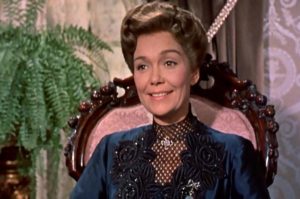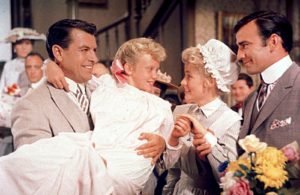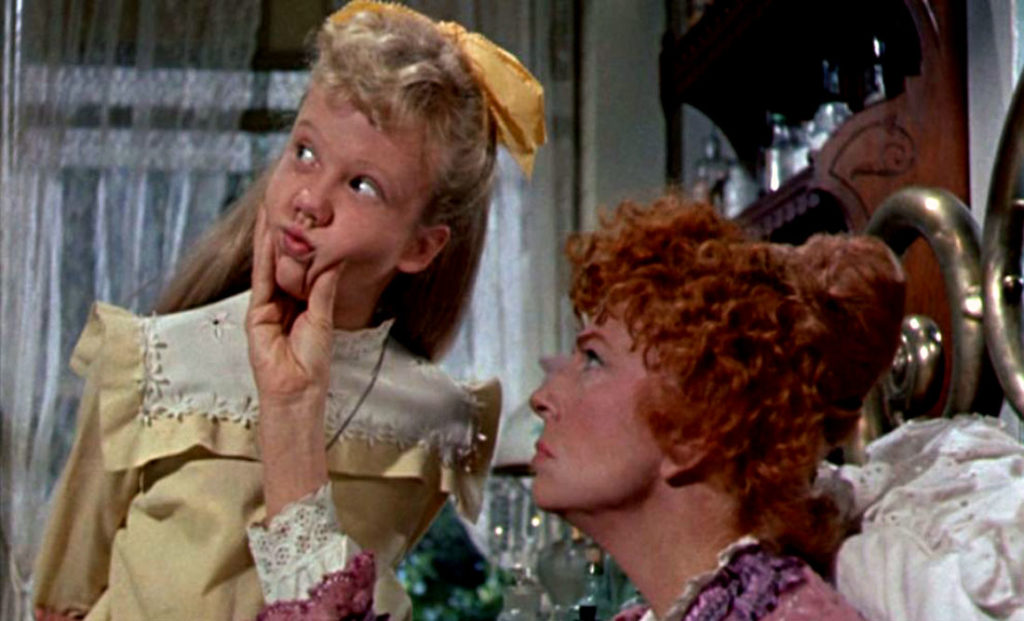This is a sweet movie. Released in 1960, and introducing Haley Mills as the titular character, “Pollyanna” is big on the kind of charm that stays with you after the credits roll. It’s backed up by solid talent, led at the forefront by Jane Wyman and Richard Eagan, and paints its early 20th Century small town, close-knit characters with skill. At 2 hours and 14 minutes it’s overlong, suffering from some pacing issues along the way. But it’s all forgivable – this is a film that you feel better during and after its viewing, a tough sell in today’s often cynicism-driven world.
“Pollyanna” is less about plot than it is feeling, although you’ll probably be able to see where it’s going along the way. The basic premise is that a young girl named Pollyanna (Mills) moves in with her rich aunt Polly (Wyman) after her parents die. The film doesn’t elaborate on the death of the child’s parents, nor does the child. Her parents, particularly her father, instilled in her the notion that it’s best to always look for the good in life, or the “glad” as she puts it. She comes almost immediately at odds with her aunt and the other townsfolk, who seem to have long ago given up on the notion that their lives could be filled with joy or look at anything any other way than “as a grown up.”
Mills absolutely charms in this movie, winning a Golden Globe and an Oscar for the most outstanding newcomer for 1960. Mills’ Pollyanna has a way of looking at the world that is bright and crisp, and you get the impression she’s getting through to people even though their tough veneers. It’s easiest with her aunt’s maids and cooks, who, lacking riches and affluence, are more willing to listen to the precocious little girl. But the film wisely avoids the temptation to make sweeping statements on the divide between the rich and the working class. The filmmakers achieve this in simple ways, such as a staff member looking at life with resigned misery no different than does the child’s Aunt Polly.

Other characters add to this in pleasing ways. There’s the town reverend, played by Karl Malden, who you know just wants to embrace the beautiful side of life but gives into the temptation to lecture on death and mortality to inspire the towns denizens through fear. There’s also Donald Crisp, playing the town mayor, who, while good-intentioned, seems unable to drive any points home without sounding bitter or confrontational. Others, such as the perpetually ailing Mrs. Snow (Agnes Moorhead) and the reclusive curmudgeon Mr. Pendergast (Adolphe Menjou) show the town’s dismal pallor. But others still, including Polly’s servant Nancy (Nancy Furman) and the town doctor, played by Richard Eagan, show positive people who back Pollyanna up in her quest to let love into their lives.
The acting is seamless, even if the story is long. “Pollyanna” is based off of the 1913 novel by Eleanor H. Porter, and was first adapted for the screen with a silent version in 1920. If “Pollyanna” does have faults they lie in both its length and over exposition, which take every step to make sure that its audience has no doubt in their mind that its heroine is a radiant soul, her opposition people who have long ago forgotten what that means. But, despite some pacing missteps, it does the film no harm. The dialogue is realistic and apt for the period, and the film’s characters are pleasing to watch and act effortlessly.
 My favorites had to be Nancy, her boyfriend George (James Drury), and Menjou’s Pendergast, who show the push and pull of Pollyanna’s attempts to infect the town with joy. This is illustrated wonderfully by cinematographer Russel Harlan during a scene at a bazaar involving a singing number by Pollyanna and three other children, dressed as various sections of the American flag. Pollyanna is wedged in the middle, stars on one side, stripes on the other, alluding to her stuck spirit trapped between those who allow joy and those who don’t.
My favorites had to be Nancy, her boyfriend George (James Drury), and Menjou’s Pendergast, who show the push and pull of Pollyanna’s attempts to infect the town with joy. This is illustrated wonderfully by cinematographer Russel Harlan during a scene at a bazaar involving a singing number by Pollyanna and three other children, dressed as various sections of the American flag. Pollyanna is wedged in the middle, stars on one side, stripes on the other, alluding to her stuck spirit trapped between those who allow joy and those who don’t.
There’s a ‘twist’ in “Pollyanna,” which is really more integral to the story than a twist; but since it’s not given away on the back DVD cover I will not give it away here. This is a nice film. Yes, it resolves itself quickly and conveniently after too long and drawn out a period, but it doesn’t matter. Like Pollyanna, Mills delights; and even though you know the rest of the adults are destined to follow suit, you’re still pleased to watch them get there. If you’re looking for a throwback family classic, “Pollyanna” will give you just what you want and more.
– by Mark Ziobro


